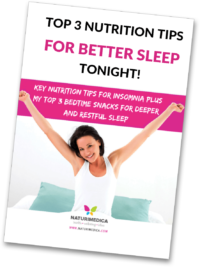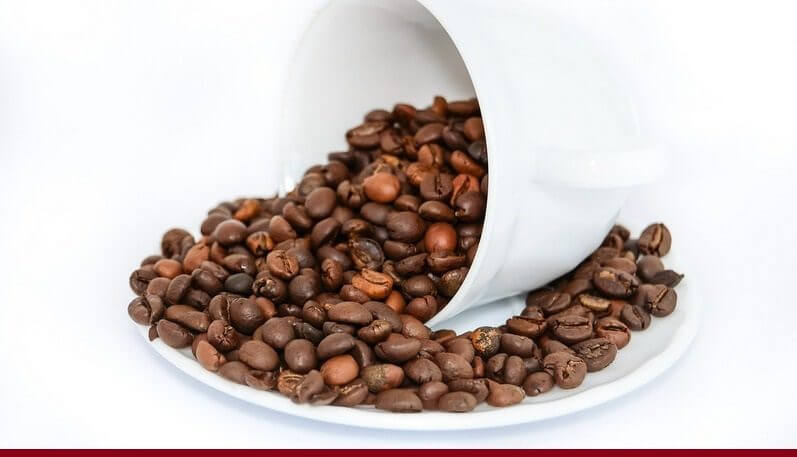In this post I discuss coffee’s health benefits (according to latest research), as well as it’s drawbacks and risks, plus my take on drinking coffee with key health considerations. I wrote it to help you ponder coffee’s pros and cons and make a decision for yourself to have it or not.
I have also included my FREE Sleep Guide download: Top 3 Nutrition Tips For Better Sleep Tonight! Key nutrition tips for insomnia PLUS my top 3 bedtime snacks for deeper and restful sleep. Get it below!
Let’s dive right in.
Just a drink or a drug?
Coffee is in the news regularly and it seems the body of data suggests that it could be beneficial for a number of medical conditions is steadily growing. It’s an amazingly potent collection of biologically active compounds which have far reaching effects on the body. As such it needs to be perceived and respected as a potent drug.
Caffeine, the most widely known compound in coffee, only makes up a mere 1% to 2% of the bean. The other ingredients such as chlorogenic acids, caffeol, polyphenols, phytoestrogens and diterpenes are now being researched regarding their effects on health.
Coffee benefits – research review
As caffeine is contained in some of the most widely consumed foods and beverages, it’s been extensively investigated in both animal models and human studies.
In summary, the main health conditions/ body systems covered in the Medscape article include:
- Cardiovascular system – despite potentially increasing blood pressure, coffee may lower the risk for coronary disease and protect against heart failure. In cited studies, moderate coffee intake was associated with a lower risk for coronary heart disease as far out as 10 years, and new data suggests that an average of 2 cups a day protects against heart failure.
- Coffee consumption may cut stroke risk by as much as 25%. While its impact on stroke risk in those with cardiovascular disease is still in question, data presented at the European Meeting on Hypertension 2012 found that 1 to 3 cups a day may protect against ischemic stroke in the general population.
- Weight loss and diabetes – studies have linked coffee consumption with improved glucose metabolism, reduced risk of type 2 diabetes and promotion of weight loss in overweight people.
- Cancer – according to recent data moderate to heavy coffee consumption (4-6 cups per day) can reduce the risk for numerous cancers. The benefits are thought to be at least partially due to its antioxidant and anti-mutagenic properties.
- Dementia and Parkinson’s disease – it’s clear that coffee temporarily affects cognition, many of us need it to get going in the morning! But new research also links it with more enduring effects on cognitive wellbeing including slowing the progression of dementia and Parkinson’s disease.
- Depression – coffee drinkers reportedly have significantly decreased risk of developing depression. A 2011 study suggests that a boost in coffee consumption might also benefit our mental health: women who drank 2 to 3 cups of coffee per day had a 15% decreased risk for depression compared with those who drank less than 1 cup per week. A 20% decreased risk was seen in those who drank 4 cups or more per day.
- Liver disease – coffee has been reported to slow disease progression in alcoholic cirrhosis, hepatitis C and non-alcoholic fatty liver disease (NAFLD). The liver helps to break down coffee, but coffee might also protect the liver (in some cases).
- It can also be beneficial for dry-eye syndrome, gout and in preventing MRSA infection. Coffee and hot tea consumption were found to be protective against one of the most concerning bugs, methicillin-resistant Staphylococcus aureus (MRSA).
Drawbacks and risks
As is often the case, with the benefits come the risks, and coffee consumption certainly has negative medical and psychiatric effects to consider.
The Medscape News report mentions that besides the potential increase in blood pressure, coffee can incite or worsen anxiety, insomnia, tremor and potentially elevate glaucoma risk. Also, given the potential severity of symptoms, caffeine withdrawal syndrome is under consideration for classification as a type of mental disorder.
I would also add the following drawbacks:
- The acidity of coffee is associated with digestive discomfort, indigestion, heartburn, GERD and dysbiosis (imbalances in gut flora).
- Caffeine is a known inhibitor of the CPY450 enzymes in the liver, and it makes it harder for your liver to detoxify substances. For example, it hinders the liver’s ability to detoxify hormones, medications and environmental toxins that we are exposed to on a daily basis.
- Elevated urinary excretion minerals such as calcium, magnesium and potassium have been noted in coffee drinkers. An imbalance in the electrolyte status can lead to serious systemic complications. It also interfers with iron absorption.
- Use coffee with care if you have depleted adrenals manifesting in fatigue, low energy, sugar cravings and heightened stress response.
- Constituents in coffee can interfere with normal drug metabolism and detoxification in the liver making it difficult to regulate the normal detoxification processes in the liver.
- Another issue to be aware of is that for certain medications that are poorly absorbed to start with, their absorption decreases even further, with coffee making many symptoms worse.
- Addiction is often an issue with coffee drinkers. Ask any coffee drinker about how it feels to withdraw from coffee, and you may mistake their story for that of a drug addict’s…
It’s worth noting that the above evidence and cited studies didn’t specify the types and preparations of coffee used. Naturally it makes a difference from the nutrition and symptoms points of view.
My take on drinking coffee
Although I also enjoy a cup of coffee now and then, I don’t consider it as food required for our health and wellbeing. While certain people may tolerate coffee and even enjoy some health benefits, it’s evident that it’s not for everyone.
However, if you decide to keep drinking it, have only good quality coffee and consider the following:
- Have organic coffee whenever possible – coffee crops are heavily sprayed and the pesticides remain in the coffee beans. Go for the free-trade varieties that are farmed using more traditional methods in developing countries (that way you can also help the farmers!).
- Have it between the meals – coffee speeds up the digestion and movement of food through the gut and thus decreases absorption of many nutrients as well as medications. Having coffee with or immediately after meals is most problematic.
- Have black coffee (e.g. short or long black) rather than one with milk. Most supermarket milks are highly processed foods and, if not organic, they contain traces of hormones, pesticides and preservatives which add to the body’s toxic load. If you can’t give up white coffee, use a small amount of cream instead (ideally organic).
- Have it in glass or ceramic cups – take-away coffee sold in plastic containers has traces of plastics and other preservatives/coatings found inside the cups and released with the heat.
- Coffee is dehydrating so you need to add an extra glass of water per coffee cup you consume per day.
- Skip the sugar – it adds up if you are having a few cups per day plus sugar will ruin any of the benefits discussed above by spiking your insulin levels contributing to insulin resistance.
- If you have depleted adrenals and cortisol imbalances it’s imperative you stop drinking coffee during the treatment until they are fully restored.
Summary
Given the pros and cons mentioned above, further research is necessary to better assess and balance the potential benefits and drawbacks of coffee consumption.
In the meantime, you can test coffee’s benefits and/or drawbacks on yourself by, for example, taking a break from it for about 3-4 weeks and see how you feel!
What’s your view on this topic? Do you have any updates to add? Please comment below.
Please note that the above material is for informational and educational purposes only and is not intended as a substitute for medical advice, diagnosis, or treatment. Consult with your health practitioner or doctor for advice specific to your circumstances.
Joanna Sochan
Wholistic Health and Lifestyle Therapist
Natural and Lifestyle Therapies for Abundant Health and Wellbeing
Having trouble sleeping? Download my FREE Sleep Guide!
Top 3 Nutrition Tips For Better Sleep Tonight! Key nutrition tips for insomnia PLUS my top 3 bedtime snacks for deeper and restful sleep

What will you gain from this guide?
If you’re currently suffering from insomnia and/ or interrupted sleep, especially if they are related to fatigue, adrenal fatigue, anxiety or hypoglycemia, this guide will provide you with what you need to do to sleep better.
Download the Top 3 Nutrition Tips For Better Sleep Tonight! Free Guide here and start sleeping better tonight!
Additional resources
- How to drink enough water daily and improve your health: Dehydration
- How to drink enough water daily and improve your health: Electrolytes
- Adrenal fatigue treatment: The Kalish Method in Australia
- Optimal healthy gut diet plan – a case study
- Digestive first aid for bloating, reflux, constipation or diarrhoea
Disclaimer: The above material is for informational and/or educational purposes only. It should not be used to self-diagnose and it is not a substitute for a medical advice, diagnosis, treatment, prescription or recommendation. All viewers of this content, especially those taking prescription or over-the-counter medications, should not make any changes in their health regimen or diet before first consulting a doctor or other qualified health provider with any questions they may have regarding a medical condition or their particular circumstances.

Joanna Sochan is a Natural Therapist and founder of Naturimedica Holistic Wellcare. She has a passion for helping clients transform their lives by becoming healthy and well naturally. Joanna has 12+ years experience in clinical practice and has special interest in solving complex cases, gut health, food sensitivities, hormone imbalances, autoimmune disorders and weight loss. She helps clients individually (mostly online) Australia-wide and also offers online therapeutic programs, eCourses and self-help eBooks. View full bio.
 Print This Post
Print This Post 

Thanks, Joanna, for sharing such engaging content on this topic. And not just the content, I found the comments quite interesting here.
I am a huge coffee lover myself, but following your advice, I will try to shift to Organic coffee :)
Glad you enjoyed the post!
Thanks a lot really you are so awesome. This article is so beneficial to me.
Thank you a lot Joanna, I will always read for you. (So pls can you tell me any website, telegram channel, Youtube or any other social media you write on it)
I am 20 years old with good health and drink one or two cups at most per day (just when need to concentrate and relieve headache while studying).
The only effect that I am using the bathroom a lot lol but no problem I drink extra water and this is only the bad effect but not so deeply bad.
So what is your advice for me? Keeping drinking or stopping.
Hi Mohamed
I’m glad my blog was of help to you. Re continuing drinking coffee – you need to make up your mind by considering what you’ve read and how you feel after drinking it. I’d suggest you find other drinks you enjoy and that are better for your body:)
Follow me on:
Instagram: https://www.instagram.com/naturimedica/
Facebook: https://www.facebook.com/Naturimedica
LinkedIn: https://www.linkedin.com/in/joannasochan/
Pinterest: https://www.pinterest.com.au/naturimedica/
Hi Joanna!
I appreciate your blog post. I am not addicted to coffee (I can go off coffee easily without withdraws), but I love my one cup of joe in the morning. If I have depleted adrenals, is it okay to have one cup in the morning? Or should I completely remove it from my diet (at least until I restore my adrenals)? I am not sure how much you know about the effects of coffee-drinking, but you seem to know your health stuff!
From my experience if you have adrenal fatigue it’s best to avoid all coffee and caffeinated drinks for at least 6 months whilst undergoing adrenal restoration.
Glad it found it useful, thank you for your feedback!
Great article!!!! Thank you so much! best article I’ve read so far
Thank you for reading! I’m glad it was helpful:)
Please reply ASAP as this would really help with my assignment!!!! :)
Question: Coffee has always found its way into people’s hearts. It is not only a popular beverage, it is added to many foods, and also can be said to be a form of medicine. So why is coffee labelled negatively, a product that should be avoided when it is also said to be good for you. Coffee – Friend or foe?
When you’re healthy and have good digestion, energy (the adrenal glands are working well) and good cognitive/ brain function, you can enjoy coffee and its benefits! We are all different and need to test/try different foods to see what effect they have on us i.e listen/ feel the body’s feedback.
Wow. Thanks for the help. But why are people and advertising of companies constantly changing their minds about whether coffee is good or bad for you?
Good stuff Joanna! I own a coffee estate and what I would say is that Coffee is good if we take in proper amount. You had mentioned things very clear in this article, cheers!
Thank you for reading and commenting!
Great blog Joanna. Good to see common sense combined with some more in depth information.
I’m always learning – it never seems to stop. Thank you!
Cheers Jeff
You’re welcome Jeff, thank you for reading! And for taking the time to comment as well:)
Aldi stock organic fair trade coffee ground beans. Keep coffee in the freezer as it goes rancid if it’s not freshly ground. Coffee also blocks iron absorption.
Thank you for this information Heather!
That’s me to a T aswel!… The past year I have enjoyed just one a day at 10am. On the very rare occasion I will have another in the arvo, definitely no later than 4pm. As it makes me to ‘wired’ aswel!… I am a mum of 3 young boys and live on acerage, so my lifestyle is very full on. Especially this day and age with life being so fast forward as it is… I think it’s time I look at investing in a good quality coffee tho, at the moment we are absolutely loving Aldi coffee from their coffee machine. May have to say goodby to our Aldi coffee ????
Supporting liver function would be indicated here. Dandelion coffee/ tea and herbs such as globe artichoke and St Mary’s thistle are my top suggestions.
So is it worth drinking coffee?
All aside, what would you say for students especially?
When would be a good time to start drinking coffee?
Which types of coffee should you completely avoid?
Good questions, thank you Student!
I’d say if you feeling energised and alert after drinking coffee and don’t have any health conditions, such as adrenal depletion, high blood pressure or gut problems, and you don’t get any side effects as mentioned in my post (e.g. sleep problems, anxiety, irritability etc), then you likely belong to the group of people who can enjoy drinking coffee and its benefits.
What to avoid? Non-organic coffee varieties. Coffee crops are heavily sprayed with chemicals and pesticides and non-organic coffee beans are left with a residue that contributes to the toxic load of the body. So choose the best coffee you can get. Plus don’t drink it from plastic caps, use cups instead to avoid adding plastics and other chemicals to your coffee!
New research has come to light that demonstrates another unexpected health benefits of coffee. This comprehensive study that lasted more than 18 years, and involved more than 70,000 women in the US, of age between 30 and 44, revealed an interesting fact: participants who had more than three cups of coffee a day, had a 15% reduced chance of tinnitus development. This number jumped up to 20% for the women that had more than four cups.
I am drinking 3-4 cup of coffee in a day is it good or not.. And please suggest brand of coffee that I can choose.
It depends! If you’re in good health and don’t have any side effects from it such as sleep disturbances, headaches or feeling wired, then it may be OK. Make sure you choose organic coffee to avoid any traces of pesticides and chemicals used in growing and processing it.
How about powdered coffee? The one that we can buy at the groceries?
Instant coffee is highly processed with added preservatives to keep it in a powder form. It’s the least nutritious form of coffee, in my opinion.
Thank you for your comment.